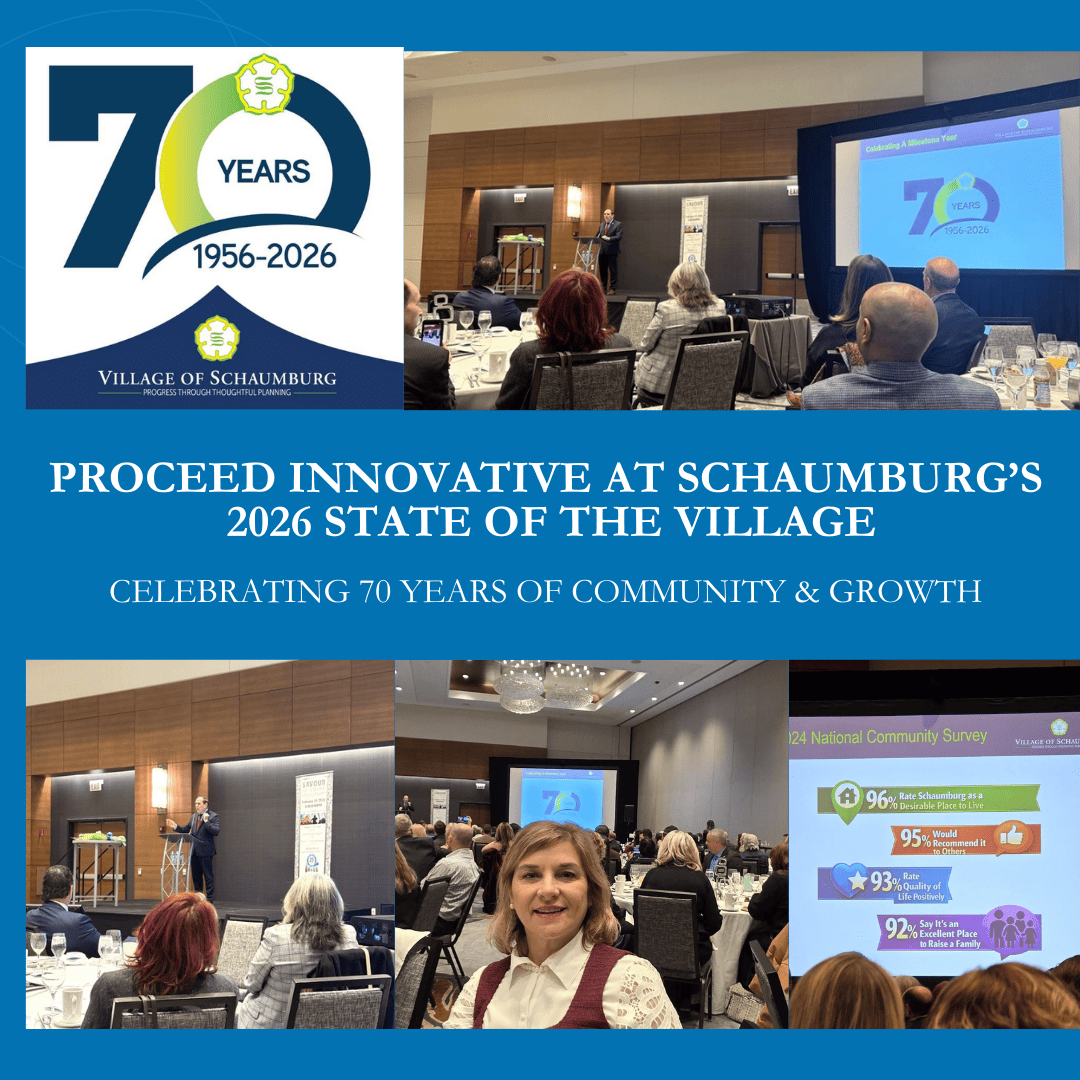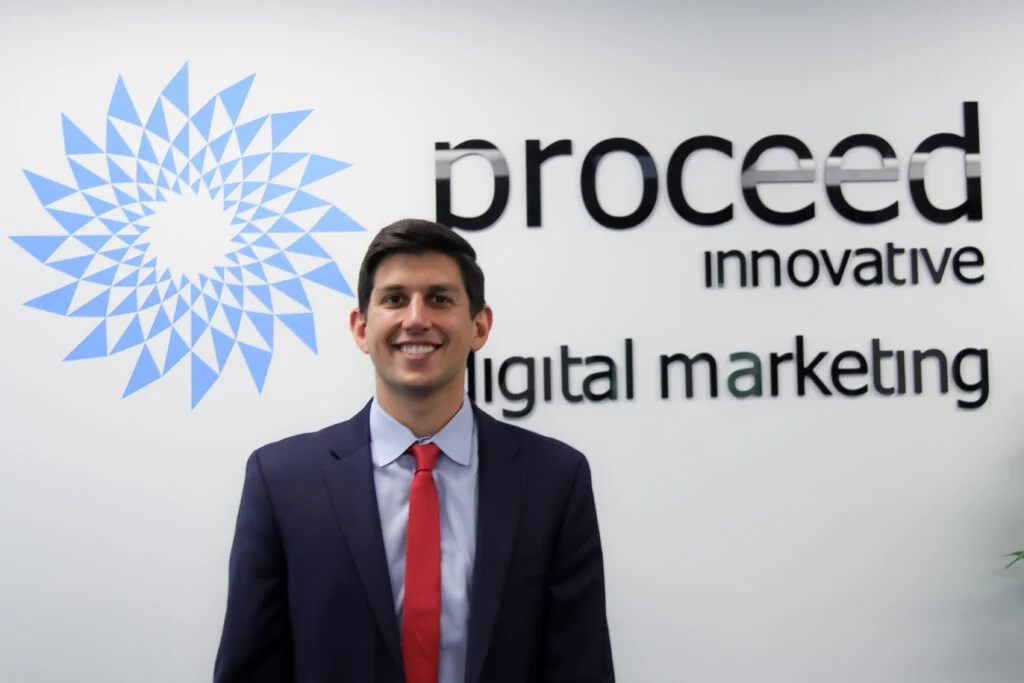Summery: Generative AI is rapidly reshaping content creation and SEO, offering benefits like faster production and broader scalability. However, it also presents challenges—such as producing generic, low-quality, or factually inaccurate content. While AI is a powerful tool, it can’t replace the value of human insight. To truly engage audiences and rank well in search results, content must align with Google’s E-E-A-T standards: Experience, Expertise, Authoritativeness, and Trustworthiness. As search engines evolve and begin serving AI-generated answers directly in search results, businesses must adapt by blending AI efficiency with human creativity and strategic SEO practices. In this new era of content marketing, quality, originality, and credibility are what set successful brands apart.
Creating high-quality content that informs, engages, and builds trust with your target audience has always been a cornerstone of successful digital marketing. Great content not only strengthens brand authority but also improves your visibility in search engine results pages (SERPs), as Google prioritizes pages that provide the most helpful and relevant answers to user queries.
In recent years, generative AI has significantly transformed the landscape of content marketing and search engine optimization (SEO). With the rise of AI-powered writing tools, marketers can now produce blog posts, product descriptions, and social media copy in seconds. This explosion in AI-generated content is reshaping how brands communicate—and how search engines interpret and deliver results.
However, while AI can accelerate the content creation process, it often falls short in areas that matter most to users: authenticity, accuracy, and connection. Without a human perspective, AI-generated content can feel generic—or worse, misinformed. That’s why it remains critical for businesses to ensure that all content, even if AI-assisted, reflects the experience, expertise, authoritativeness, and trustworthiness (E-E-A-T) that Google values.
In this guide, we’ll explore:
How generative AI is changing content creation and SEO
The risks and rewards of using AI for marketing
How to use AI responsibly while maintaining a human-centered approach
Strategies to align your content with Google’s E-E-A-T principles and reach your ideal audience

How AI Has Redefined Content Creation and Search
The landscape of content creation has been fundamentally reshaped by the rise of generative artificial intelligence (AI). These powerful models are trained on vast amounts of text, images, and audio data, enabling them to detect patterns, understand context, and generate content that often mirrors human-like fluency and structure.
What makes generative AI so transformative is its ability to produce high-quality content at scale. From blog posts and social media captions to product descriptions and email campaigns, marketers can now create large volumes of content quickly and efficiently. Despite not being human-generated, AI-produced content can demonstrate surprising levels of coherence, relevance, and even a sense of expertise—especially when fine-tuned for specific industries or topics.
In parallel, search engines are also embracing AI to better interpret search intent and deliver more relevant results. AI enables them to synthesize information, generate direct answers, and structure content in ways that improve the user experience.
The accessibility of these tools has revolutionized how content is created, consumed, and discovered—empowering marketers to streamline workflows, increase productivity, and reach broader audiences. However, to truly connect with users and satisfy search engine standards, this technology must be used wisely—with human insight and oversight leading the way.
AI-Generated Content: A Game-Changer for Content Creation
Over the past five years, the use of AI technology in content creation has surged. According to a 2024 McKinsey & Company survey, 71% of businesses now use generative AI for at least one function—up from 55% in 2023. This rapid adoption shows no signs of slowing down, especially as companies explore how AI can streamline marketing, sales, customer service, and operations.
Marketing Leads the Way in AI Adoption
The most common use of generative AI is in marketing content creation—from brainstorming ideas and building content outlines to writing full blog posts, product descriptions, and social media copy. These tools allow marketers to ideate and execute content strategies faster and at scale.
Popular Generative AI Tools
Several powerful tools have emerged as leaders in AI content creation:
ChatGPT (OpenAI) and Google Gemini leverage natural language processing (NLP) to generate human-like responses based on prompts. The quality of their output depends heavily on the precision of the user’s input.
Jasper AI is a marketing-focused content tool that lets users define topic, tone, keywords, audience, and brand voice. It also allows uploading of style guides and brand documents to fine-tune AI-generated output for consistency and impact.
Benefits of Using AI for Content Creation
Speed and Scalability: Produce large volumes of content quickly
Brand Consistency: Maintain a unified tone and messaging across platforms
Content Planning Support: Easily brainstorm, outline, and test content ideas
Limitations of AI-Generated Content
Despite its advantages, AI content has its drawbacks:
Generic Tone: Without human input, AI content can feel flat or lack emotional resonance
Inaccuracy Risk: Misinformation or outdated facts can damage credibility if not properly fact-checked
Lack of Original Insight: AI cannot replicate firsthand experience or nuanced perspectives, which are essential for building trust
To maximize the value of AI-generated content, it’s crucial to combine it with human expertise—editing, enriching, and fact-checking content to ensure it aligns with your brand and resonates with your audience.
AI Search Engines: Changing How Users Access Information
The rise of generative AI in search engines is redefining how users discover content online. Instead of simply listing links to websites, modern search engines are increasingly using AI to generate direct, conversational answers—reshaping the look and function of search engine results pages (SERPs).
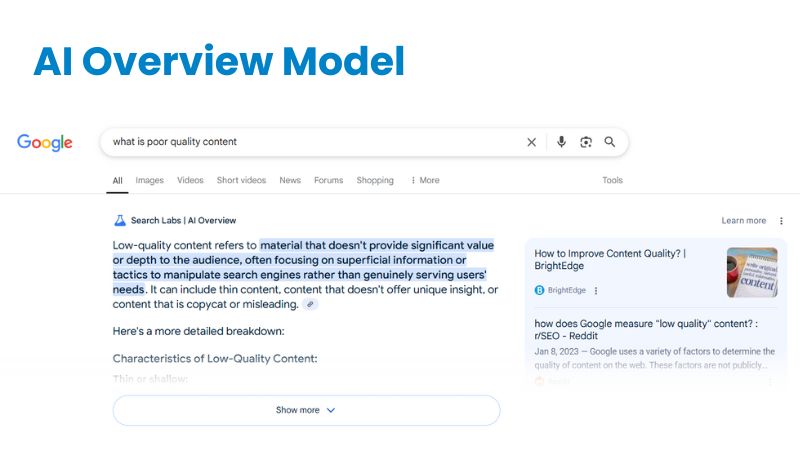
How AI Is Changing Search Behavior
Traditionally, search engines like Google, Bing, and Yahoo ranked websites based on how well they answered a user’s query, providing a list of links in response. Users would then visit individual pages to find the information they needed.
Now, with AI-powered search, engines can instantly generate summarized answers at the top of the SERP by analyzing and pulling content from multiple trusted sources. This AI snapshot allows users to get quick answers without needing to click through to multiple sites.
Some platforms have taken this a step further:
You.com and Perplexity integrate conversational AI, enabling users to refine their queries in a chat-like format.
These tools often present summarized responses along with citations to source websites, offering a blend of efficiency and transparency.
What This Means for Brands
Increased Visibility Through Citations
Businesses that maintain strong, SEO-optimized content may be cited in AI-generated summaries, driving credibility and potential referral traffic.Fewer Clicks From SERPs
If an AI summary satisfies the user’s intent, they may not click through to any website—reducing traditional web traffic opportunities.
What You Can Do
To stay visible in an AI-powered search landscape:
Continue investing in high-quality, authoritative content.
Optimize for E-E-A-T (Experience, Expertise, Authoritativeness, Trustworthiness).
Ensure content is well-structured and easy to reference.
Use clear headers, facts, and up-to-date information to increase the chance of your content being cited by AI tools.
Incorporating the Principles of E-E-A-T in AI-Generated Content
Whether content is created by a human or assisted by AI, the same rule applies: content that is authentic, trustworthy, and truly valuable to the user will always perform best. Google’s algorithms are designed to reward content that demonstrates a high level of Experience, Expertise, Authoritativeness, and Trustworthiness (E-E-A-T)—a framework that’s especially important in the age of AI-generated content.
For content creators and marketers using AI tools, integrating E-E-A-T principles is not optional—it’s essential. Even when leveraging generative AI for speed and scale, human oversight is needed to ensure the content reflects genuine insight, accurate information, and brand credibility.
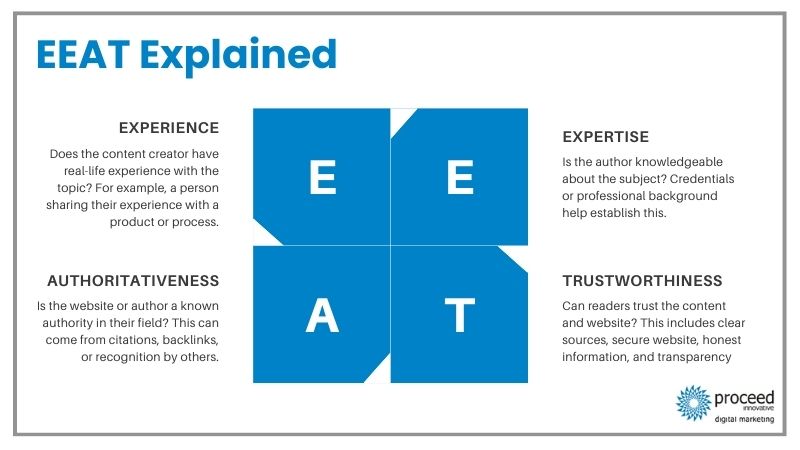
What Is E-E-A-T?
E-E-A-T stands for Experience, Expertise, Authoritativeness, and Trustworthiness—a set of principles used by Google to assess the quality and credibility of web content. While not a direct ranking factor in Google’s algorithm, E-E-A-T plays a critical role in how Google’s search quality raters evaluate content, which in turn helps shape future algorithm updates.
For content creators and digital marketers, aligning with E-E-A-T means producing content that demonstrates real value, is backed by expertise, and earns user trust—all essential to performing well in search engine results.
A Breakdown of E-E-A-T Principles
✅ Experience
Does the content reflect first-hand experience?
Google values content created by individuals who have direct, real-world experience with the subject. For example, a product review written by someone who actually used the product is considered more valuable than a generic summary.
✅Expertise
Is the content written by someone with deep knowledge of the topic?
Expertise is especially important in topics like health, finance, and law (known as Your Money or Your Life—YMYL topics). Content should be created or reviewed by professionals or subject matter experts when accuracy is essential.
✅Authoritativeness
Is the content—and the source—recognized as a go-to authority in its field?
Authoritativeness can come from the website, the content creator, or even cited sources. Earning backlinks, mentions, and recognition from other reputable sources helps build this signal.
✅Trustworthiness
Can users trust the information, source, and website as a whole?
Trust is foundational. This includes having accurate information, transparent sourcing, secure browsing (HTTPS), clear contact info, and positive user signals like reviews or testimonials.
Why AI-Generated Content Must Adhere to E-E-A-T
Generative AI has revolutionized content creation by enabling faster production at scale. For marketers and businesses, this means more content, more quickly—but also a higher risk of publishing content that is generic, incomplete, or factually incorrect.
While using AI-generated content is not against Google’s guidelines, Google has made it clear that content quality—not the method of creation—is what matters most. Content must still meet the standards set by E-E-A-T: Experience, Expertise, Authoritativeness, and Trustworthiness.
The Risks of Unchecked AI Content
AI-generated content can:
Contain inaccuracies or fabricated information (“AI hallucinations”)
Omit essential details or context
Feel impersonal or lack depth, reducing user engagement
Undermine your brand’s credibility and trustworthiness
Publishing low-quality or misleading content—regardless of its origin—can negatively impact your rankings and reputation.
What Google Expects
Google rewards content that is:
Helpful and informative
Accurate and well-sourced
Created or reviewed by people with real-world experience
Aligned with E-E-A-T principles
Low-effort, mass-produced content that offers little value is increasingly being devalued in search rankings, especially if it doesn’t demonstrate originality or trustworthiness.
Best Practices for Using AI in Content Creation
You can use AI responsibly and effectively by following these steps:
Use AI for ideation, outlining, or drafting, not full automation
Fact-check and review all content manually
Add human insight, brand voice, and context to improve clarity and depth
Include personal experience, real examples, and expert perspectives
Ensure all information aligns with Google’s E-E-A-T standards
How to Create Quality AI Content
Creating content with generative AI can significantly improve efficiency, but to ensure the end result is accurate, engaging, and valuable, human oversight is essential. The key is knowing which steps can be automated and which require a human touch.
Striking the right balance allows you to produce content that not only performs well in search engine results pages (SERPs) but also builds credibility with your audience.
Focus Areas for Creating Quality AI-Generated Content
✅ Incorporate Human Expertise
AI can support content creation, but it can’t replicate human insight, critical thinking, or firsthand experience. Here’s how to blend automation with expert input at each stage of the process:
1. Topic Ideation
AI Role: Use generative tools to quickly brainstorm relevant topic ideas based on audience interests and industry trends.
Human Role: Review and refine topics to ensure they align with your business goals, content strategy, and audience needs.
2. Research
AI Role: Summarize broad concepts and provide background information.
Human Role: Direct the research, verify facts, and decide which topics or angles add the most value to the content.
3. Outlining
AI Role: Generate a draft outline with sections, headers, and supporting points.
Human Role: Adjust the outline to ensure logical flow, remove unnecessary sections, and insert unique talking points based on brand voice or expertise.
4. Content Drafting
AI Role: Create a rough draft, suggest phrasing, and generate supporting content for specific sections.
Human Role: Review and revise the draft to improve clarity, tone, and structure. Add depth with:
Real-world examples or personal experience
Expert insights or commentary
In-line fact checks and citations
Emotional resonance and conversational tone
By combining the speed of AI with the knowledge, creativity, and intuition of human editors, you can produce high-performing content that is not only informative but also authentic, trustworthy, and search engine-friendly.
Avoid Generic AI Content: Stand Out with Human Insight
One of the biggest drawbacks of AI-generated content is that while it may be grammatically correct and structurally sound, it often comes across as dry, generic, and uninspired. This type of content doesn’t captivate readers, nor does it differentiate your brand from competitors.
Why? Because AI tools rely on pre-existing information—content that’s already been published and indexed. As a result, the output lacks originality and the nuance that comes from real-world experience.
Bring Your Content to Life with Human Expertise
Your team holds a level of expertise, insight, and lived experience that no AI tool can replicate. Infusing your content with these human elements not only enhances authenticity but also builds trust and authority with your audience.
Here are a few impactful ways to add a personal touch to AI-assisted content:
Case Studies: Share real examples of how your team solved a problem or delivered results for clients.
Original Data & Research: Use proprietary data or insights to strengthen your points and add value no one else can replicate.
Anecdotes from the Field: Talk about on-the-job experiences, client interactions, or lessons learned through hands-on work.
Industry Trends & Best Practices: Weigh in on what’s happening in your industry, and share your expert perspective on what businesses should pay attention to.
Why It Matters
Adding this level of depth not only makes your content more engaging and memorable, it also signals to both users and search engines that your brand is a trusted authority. That’s the kind of content that gets shared, earns backlinks, and ranks well over time.
Disclose AI Use to Build Trust
As AI becomes more common in digital content creation, audiences are becoming increasingly aware—and curious—about how brands are using it. If your business uses AI to generate or modify content, it’s wise to be transparent about it.
Openly disclosing your use of AI demonstrates honesty and integrity, helping to build trust with your audience. It also empowers readers to make informed judgments about the content they consume, especially when accuracy and credibility are essential.
Even a simple note stating that AI was used to assist with research, outlining, or drafting can go a long way in reinforcing your brand’s authenticity and ethical standards.
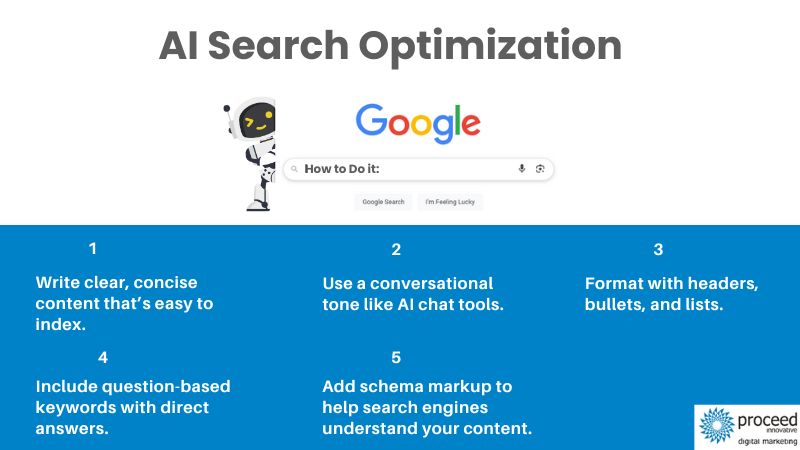
How to Optimize Content for AI Search
Whether your content is human-written or AI-assisted, it must be optimized not only for traditional SEO but also for emerging AI-powered search engines. As search platforms like Google, Bing, You.com, and Perplexity integrate generative AI to deliver direct answers, your content should be structured to align with how AI interprets and summarizes information.
While standard SEO practices still apply, optimizing for Generative Engine Optimization (GEO) can improve your visibility in AI-generated results. Here’s how:
Tips to Optimize Content for AI Search:
Write clear, concise content: Keep your messaging straightforward and easy for AI to scan and summarize.
Use conversational language: Mirror the tone and phrasing used in chat-style tools like ChatGPT or Google Gemini.
Structure with headers and lists: Use H1-H3 headings, bullet points, and numbered lists to improve readability and scannability.
Target question-based keywords: Use queries your audience might ask (e.g., “What is E-E-A-T?” or “How does AI affect SEO?”) and provide direct, helpful answers.
Implement schema markup: Help search engines better understand and categorize your content using structured data (e.g., FAQ, Article, HowTo schema).
By combining transparency, traditional SEO, and GEO best practices, your content can stand out—both to your readers and to AI-powered search systems.
The Future of E-E-A-T in the AI Era
As generative AI continues to reshape content creation, search engines are placing less emphasis on how content is made—and more on what it delivers. Value, relevance, and trustworthiness remain the top priorities, regardless of whether content is written by humans, AI, or a combination of both.
To stay competitive and build lasting credibility, it’s essential to consistently apply the principles of E-E-A-T (Experience, Expertise, Authoritativeness, and Trustworthiness) across all content.
Why E-E-A-T Still Matters—And Always Will
While Google currently evaluates content quality based on E-E-A-T rather than its origin, future algorithm updates may place even greater emphasis on originality and accuracy, especially as AI-generated content becomes more widespread.
Continuing to follow E-E-A-T guidelines helps you:
✅ Stand out in a crowded content landscape
✅ Build long-term trust with your audience
✅ Establish your brand as a go-to authority in your industry
✅ Future-proof your SEO strategy against upcoming algorithm changes
SEO and Content Marketing from Proceed Innovative
As generative AI continues to revolutionize how content is created and delivered, one truth remains clear: quality, authenticity, and trust are still the foundation of successful content marketing. While AI tools bring speed and scalability, they can’t replace the insight, creativity, and experience that only humans can provide.
At Proceed Innovative, we help businesses strike the right balance—leveraging the efficiency of AI while ensuring every piece of content reflects the expertise and credibility that audiences and search engines expect.
By aligning our SEO and content strategies with Google’s E-E-A-T (Experience, Expertise, Authoritativeness, and Trustworthiness) framework, we help you create content that:
Ranks higher in search engine results
Builds lasting trust with your audience
Reflects your unique voice and industry authority
As AI reshapes the digital landscape, businesses that prioritize relevance, transparency, and human insight will be the ones that stand out—and succeed.
Let Proceed Innovative guide your brand through the evolving world of SEO and content marketing. Together, we’ll create content that connects, converts, and earns long-term visibility.
To learn more about our SEO services, you can call Proceed Innovative at (800) 933-2402 or contact us online.


